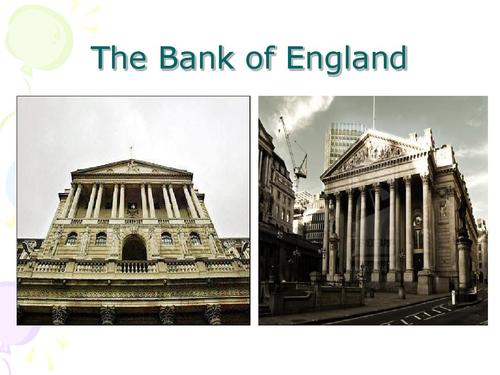Essay Question
By
Instructor
Course
Institution
Location
Date
Essay Question
Bank of England代写 The Bank of England gained operational independence in 1997 (Taaffe, 2017).It functions as the central bank for the United Kingdom.
Achievements of Bank of England Bank of England代写
The Bank of England gained operational independence in 1997 (Taaffe, 2017).
It functions as the central bank for the United Kingdom. The bank started operations in 1694 as a private institution with the power to raise money for the government through the issuance of bonds. It then accepted deposits like other commercial banks. BoE was first issued with the monopoly of issuing banknotes in England and Wales in 1844. It was then nationalized in 1946 after World War II. Bank of England代写**范文
In 1997, the functions of monetary policy were relinquished by the government to BoE (King, 2017). Like any other central bank, it has wide range of responsibilities. Since its independence, the bank functions as the lender of the last resort, the United Kingdom’s bank, issue currencies, and formulate monetary policy. It also makes policies during periods of economic downturns and increased uncertainty.
The creation of banknotes has become more liberal and democratic. Bank of England代写
The Bank has created public confidence in banknotes. Being the only bank that can issue banknotes, BoE prides itself on striving to ensure the notes are of high quality, durable and difficult to counterfeit. People will have the feel of genuineness in the new banknotes because they are made with the latest anti-forgery features. The bank works closely with De La Rue to make sure the notes are defined to make it difficult and time-consuming to forge. Bank of England代写**范文
The plans are underway to release new polymer £20 notes by early 2020, and £50 notes will be issued by 2021. When these notes are entirely in circulation, they will create confidence in transactions. The bank is also applauded for its transformative ideas of creating diversity and cultural recognition to feature mathematician, Allan Turing.
The BoE has succeeded in keeping the United Kingdom’s economy on the right track through monetary policy. Bank of England代写
Since independence, the bank has been regulating interest rates up and down while supplementing it with measures such as quantitative easing. It is the role of the Monetary Policy Committee to make decisions on monetary policy. The bank influences how much prices are rising. Thus, it uses monetary policy to achieve the target inflation level at 2 percent (Bank of England, 2019, p. 2). The low and sustainable inflation rate is suitable for economic growth and development. The bank has been active in supporting the UK government in the achievement of economic growth and job creation. Thus, the current bank rates stand at 0.75 while inflation is 1.7 percent below the target rate.
Therefore, the setting of interest rates has been free from politics. Bank of England代写
Before 1997, interest rates were changing sporadically any time on any day. The chancellor would call the treasure at any time to discuss the change in interest rates without any consultations and unsystematic. For instance, after receiving the budget, the government had the freedom to reward itself with a cut in interest rates. When the inflation targets were introduced after 1992, a systematic process was introduced when the chancellor and the governor would meet with advisors for deliberations. However, even after the establishment of a system, politics found their way in decision making. Under the current Monetary Policy Committee, the decisions on interest rates are made through majority votes.

Figure 1: Source: https://www.tutor2u.net/economics/reference/monetary-policy-the-bank-of-england

Figure 2: Source: https://www.tutor2u.net/economics/reference/monetary-policy-the-bank-of-england
There were clear roles of BoE and Treasury before independence. Bank of England代写
After 1997, the Treasury was able to adjust to its position of fiscal policy and other factors affecting the economy leaving monetary policy a function of BoE. Thus, the constrained relationship that existed before independence ended. The implication of the stability in the regulation of monetary policy led to higher economic performance. The action for BoE independence also reduced the perceived powers of the governor. Compared to the previous period in 1970s, the inflation rates were averaging at 27 percent.
Even at the times of Thatcher, the average inflation was 8 percent. However, since the introduction of inflation rate targets in 1992 and five years after creating an independent BoE, the inflation rate has been low and stable. Instability in inflation is a significant concern to businesses and households. After the bank succeeded in making inflation sustainable and steady, it has been removed as a significant worry. Bank of England代写**范文
As a result, for the last two decades, economic growth has been rising and stable. The strong monetary policy could have made Britain stand out against 2007/2008 global financial crisis. Some historians argue in support of the removal of bank supervision by the BoE in 1997. The independence of the central bank played a critical role in the handling of the financial crisis. The coordination between BoE and the U.S. Federal Reserve led to interest rates cut in 2008.
The Bank of England has created confidence in the banking sector, markets, and infrastructure. Bank of England代写
Since independence, the central bank has been able to play a critical role in maintaining financial stability, which it has achieved through a series of mechanisms, policies, and frameworks. The bank established a Financial Policy Committee in 2013 and is responsible for formulating and supporting economic policies and other matters it should have regard in exercising its functions. Since then, the committee has identified, and assess risks to the United Kingdom’s financial stability on an ongoing basis set out its assessment and actions it has taken in an accountable manner through its financial stability reports and quarterly statements and records.
CCyB Bank of England代写
Additionally, the FPC has been committed to enhancing the resilience of the financial system through the implementation of the Countercyclical Buffer (CCyB). FPC introduced a leverage ratio for systematically important U.K banks well ahead of international or EU action. Besides, The FPChasalso took effort to build greater cyber resilience in the financial system, including through the introduction of tests, known as CBEST tests. Which subject firms to simulated cyber-attacks, and are used to identify weaknesses in resilience and take action against any issues.
Through its annual assessment of risks and regulation, the FPC has also examined potential financial stability risks from non-bank financial institutions, markets, and infrastructure, and where appropriate undertaken in-depth assessments of these potential risks. Bank of England代写**范文
Alongside the Prudential Regulation Committee (PRC), the FPC introduced the assessment test of UK banks and building societies in 2014. The 2017 stress tests showed that no bank needed to strengthen its capital position. It reflects the substantial progress that has been made in enhancing the resilience of the banking sector, with bank capital ratios now three times higher than in 2008.
However, it has been criticized for its response to the financial crisis (Pettinger, 2012).
The criticisms came from MPs and public citing that the action by the central bank did not have a significant impact on the ordinary citizens but instead helped the elites when houses and other assets prices increase. According to report by Gales (2018) through Financial Times, Mr. Haldane accepted the public perception that the loosening monetary policy would make people worse off. The public was fast to note the effect of the policy on asset prices and interest cost, but it could not see how the policy would benefit them indirectly.

BoE Response to Uncertainties Bank of England代写
Brexit
Brexit has resulted in economic downturns and future uncertainties in the UK and has long term implications for inflation, productivity, public finances and exports and imports (De Lyon and Dhingra, 2019). According to Begg and Mushövel (2016, p. 2), Brexit pressure has resulted in loss of jobs due to some businesses relocating if the UK leaves EU. There are many speculations in the effect’s workers both in EU and UK since is not clear how Brexit will affect them. These and other economic effects are likely to perpetuate the current debate on Brexit and uncertainties. It is the role of BoE to formulate policies that will see the exit has less impact on the overall economy. Bank of England代写**范文
Undeniably, monetary policy plays a crucial role in accelerating the rate of economic growth and development at the time of slow growth and unpredictable future. In this regard, BoE can use to influence the supply and uses of credit combating inflation and maintaining the balance of payment equilibrium. It will also use the monetary policy after the development to also provide for an elastic supply, which can parallel the expansion in trade and population.
Thus, the use of expansionary monetary policy will increase the money supply, lowers interest rates and increases aggregate demand. The overall effect is the boost on the economy that is reflected in an increase in GDP.
The BoE can use expansionary monetary policy to stimulate the slow growth of the UK’s GDP. Bank of England代写
According to BoE governor Carney (2019) in his speech at Jackson Hole Symposium 2019, the primary tool available to the central bank is open market operations. In so doing, it will buy Treasury notes from banks, which it will use to create credit. The move replaces the bank’s Treasury notes with the loan and gives them more liquidity for lending. When the money supply is high, the banks have to reduce lending rates to loan out to extra cash. As a result, mortgage and asset loans become cheap. Also, credit card interest rates are reduced significantly, and hence the overall consumer spending is increased. Bank of England代写**范文
Similarly, when businesses can afford loans, they will expand to keep up with the increase in market demand. More jobs are needed to increase productivity, and hence employment rate is stimulated. At higher demand for workers, wages also increase and thus availing more dispensable income. The series of events will be enough to impact the market and drive economic growth by 2 to 3 percent.
Additionally, the Monetary Policy Committee may also lower its fund’s rate. Bank of England代写
That is when bank deposit cash with another bank, there is an applicable rate. According to the central bank regulations the banks are required to keep a specific amount as a reserve with the local Reserve branch every night. If a bank has more than it needs, it will lend the excess to another bank that has less, and charge the reserve fund rate. If BoE reduces the rate, it will be affordable for banks to maintain their reserve, and hence allow them to keep more money which they can use to lend.
Moreover, BoE can use a discount rate as the third tool for responding to slow GDP. Bank of England代写
It is the lending rate that BoE charges a bank that borrows from its discount window. However, the bank does not use this discount window because of lousy name attached to it. Since central bank is the lender of last resort, banks mostly use the window on if they cannot access loans from other banks. It is the perception of banks even if the discount rate is lower than the reserve fund rate. Nonetheless, BoE can lower the discount rate when it reduces the reserve fund rate.
Monetary policy Bank of England代写
However, if the government plan to spend more on public goods, while at the same time, the central bank is using its monetary policy to stimulate economic growth, there might be inflationary pressure. Both fiscal and monetary policy has a similar effect to the economy, and therefore their implications in influencing the economy need to control. Economic policy has a multiplier effect whereby the government spends more, the aggregate demand increases. Bank of England代写**范文
If the two policies meet in the marketplace, there will excess demand which will cause deficit supply. Because the producer cannot satisfy the market, they will increase the prices of products leading to inflation. Therefore, the central bank will be forced to raise the lending rates to reduce the outflow of money to the market and hence reduce the aggregate demand.
Sterling Pound depreciation Bank of England代写
Moreover, the persistence in Sterling Pound depreciation will trigger the central bank to use monetary policy to boost demand for the currency. The change in the level of interest rates influences the exchange rate. As such, since the interest rates are low, the central bank should increase it to levels that increase the demand for Sterling Pound (Elwell, 2012, p. 19). Floating exchange rates give the bank the autonomy to use monetary policy to achieve domestic stability.

References Bank of England代写
Begg, I. and Mushövel, F., 2016. The economic impact of Brexit: jobs, growth, and public finances.
Bank of England, 2019. Monetary Policy Summary and minutes of the Monetary Policy Committee meeting ending on 19 June 2019. Available from https://www.bankofengland.co.uk/-/media/boe/files/monetary-policy-summary-and-minutes/2019/june-2019.pdf
Carney, M., 2019, August. The Growing Challenges for Monetary Policy in the current International Monetary and Financial System. In Remarks at the Jackson Hole Symposium.
De Lyon, J, and S Dhingra (2019), “UK Economy Since the Brexit Vote: Slower GDP Growth, Lower Productivity, and a Weaker Pound,” LES Brexit Blogs.
Elwell, C.K., 2012. The depreciating dollar: economic effects and policy response. CRS Report for Congress, pp. 1-24.
Gale, C., 2018. Bank of England defends response to the financial crisis after criticism. Financial Times. Available from https://www.ft.com/content/4231c5a0-3caf-11e8-b9f9-de94fa33a81e
King, M., 2017. How the Bank of England was set free. Financial Times. Available from https://www.ft.com/content/388fae86-3184-11e7-9555-23ef563ecf9a
Pettinger, T., 2012. Criticisms of Bank of England. Available from https://www.economicshelp.org/blog/glossary/criticism-bank-england/
Taaffe, O., 2017. The Bank of England’s Independence. The London Institute of Banking & Finance. Available from https://www.libf.ac.uk/news-and-insights/news/detail/2017/10/06/the-bank-of-england%27s-independence
更多其他:Essay代写 Academic代写 商科论文代写 Case study代写 Proposal代写 Capstone Projects Report代写 Review代写 研究论文代写 数据分析代写 文学论文代写 论文代写




您必须登录才能发表评论。